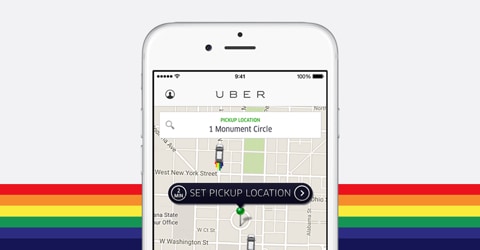As ride-hailing services like Uber and Lyft continue to grow in popularity, more and more states are considering legislation to regulate them.
The goal is to establish statewide standards and bar cities — some of which have stopped Uber and Lyft from operating — from regulating the services.
Uber and Lyft both include sexual orientation and gender identity in their nondiscrimination policies, and because they've been involved in drafting the legislation, LGBT protections are generally included. But that isn't going over well in places like Oklahoma, where the Senate voted this week to remove sexual orientation and gender identity from the state's ride-hailing bill. The Associated Press reports:
The House-passed version of the bill included language that prohibited the companies from discriminating against customers based on sexual orientation or gender identity. But Sen. Jason Smalley said he rewrote the bill to eliminate that language and allow private businesses to establish their own policies regarding discrimination.
"I believe if a private business owner wants to serve or not serve an individual, they have that purview right now," said Smalley, a Republican.
One Democratic senator unsuccessfully tried to amend the bill to require drivers wishing to discriminate against LGBT riders to post notice on their vehicles. More from the AP:
"Uber's policy is to serve every neighborhood, every driver and every person who needs a ride," company spokeswoman Jennifer Mullin said. The company will continue to enforce its current terms of service, "which make clear that discrimination in any form is not tolerated and will result in removal from the platform," she said.
Troy Stevenson, executive director of Freedom of Oklahoma, said in a statement that the group does not "understand why a member of the Oklahoma Legislature wants to remove protections for (lesbian, gay, bisexual and transgender) Oklahomans from a bill that is specific to an industry that already protects them, in their corporate policies. Oklahomans do not believe in discrimination, and it is time for ideological law makers to quit trying to distract from the real problems of our state by attacking the LGBT community."
It's unclear how many states have passed LGBT-inclusive legislation regulating Uber and Lyft. But it's safe to say that in some red states, it would amount to the first time sexual orientation and gender identity have been mentioned in statute.
Texas, for example, is considering a similar bill, which currently includes sexual orientation and gender identity. But it's hard to imagine Republican lawmakers — who are seeking to bar cities from enacting LGBT protections — won't try to remove sexual orientation and gender identity from the ride-hailng bill.
Would it be too much to ask for Uber — which actively opposed Indiana's "religious freedom" law — to insist that LGBT protections remain in the bills?
Stay tuned.




